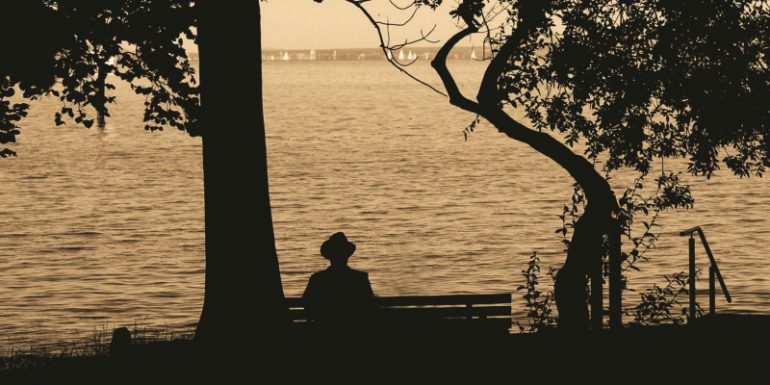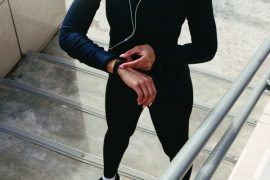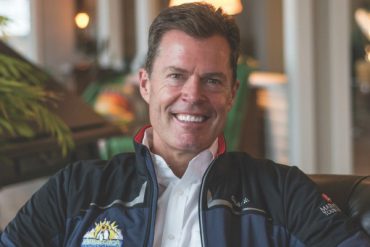By Amanda N. Wegner
What looks like success from the outside is not always reflected on the inside. This is a lesson David B. Bohl knows well. “I’ve had success in my career, I’m happily married with two children, have done all these things that looked like success from the outside,” says Bohl. “But I’ve had challenges in life, challenges in getting through life, that were not always visible.”
Bohl, who grew up in the Milwaukee area and spent summers on Lake Beulah, is the author of Parallel Universes: The Story of Rebirth, a memoir that unpacks his journey out of addiction and into contentment, from raging and wealthy alcoholic to addiction counselor.
But Bohl’s is more than a story of overcoming substance abuse and shedding the unhealthy behaviors that became his everyday coping mechanisms. Adopted by a prosperous family just a few days after he was born to an unwed mother, Bohl uncovers the warring emotions and mental hardships that come with being a “relinquished” child and dissects the deep links between addiction and adoption.
Bohl took time to chat with At The Lake about his book, finding health and happiness, the devastatingly strong connection between adoption and addiction, and something that resonates firmly with At The Lake readers: the unique form of healing that lakes offer, regardless of what ails you.
NOT FITTING IN
Bohl recalls how one day, when he was 6 years old, he couldn’t wait to tell his friends that he was adopted. But they didn’t share his enthusiasm. “I was stunned when they didn’t see it that way — that adoption wasn’t something to be proud of. That negative reaction and mistrust catapulted me into a confusing, complex, gut-wrenching journey that involved addiction and self-loathing.”
As a young boy, Bohl recalls feeling like he never quite fit in, but he wasn’t about to admit it or let the world see how he was feeling. Instead, he pushed to achieve — and overachieve — in everything he did: sailing, academics and as a trader on the Chicago Exchange floor. “For me, I never thought [being adopted] was an issue in my life,” says Bohl. “I had every advantage in life, but it was always this low-grade thing, bubbling under the surface, wondering about my family, about my adoption.”
As Bohl moved through life however, these feelings became more than a “low-grade thing.” Fueled by the hectic work of being a trader, living in Chicago with an apartment in New York, waking up on planes not knowing which direction he was headed, Bohl turned to alcohol as a coping mechanism for both personal and professional stress.
“I was successful, but it was incredibly stressful; there are few avenues that deal with that level of stress,” says Bohl, who worked as a trader for 15 years. “I’ve heard 80-90 percent of individuals in this field are using chemicals unhealthily, and 80-90 percent experience disrupted or terminated relationships. I survived, but the stress level was insane.”
He knew that both the stress and his chosen coping mechanisms weren’t something he could sustain for the long term, and as he came to realize how his choices were negatively affecting his health, he began to immerse himself in psychology, including his own. “I came to acknowledge that alcohol was my go-to coping mechanism, in stress and in social situations. I had to do some digging, some very deep digging. It was not healthy, so why was it something I wanted to do?”
But as many know, the path out from addiction is not a linear one. “When I stopped drinking, I learned the real work that had to be done … what a huge task lay before me.”
THE ADDICTION- ADOPTION LINK
What wasn’t initially apparent to Bohl as he worked to curb his addiction and unhealthy behaviors was the pervasive underlying role his entry into the world played. Instead, it took a major medical event to start him down that path. “In my mid-40s I had a grand mal seizure and needed to find some medical history, for myself and for my children,” he says. “Long story short, I found addiction handed down on both sides and chronic relationship disruptions resulting in my adoption.”
Unfortunately, this is not the exception, but the norm. According to the National Adoption Council, people who are adopted are 1½ times more likely to have numerous disorders such as eating disorders and stress compared to those who are not adopted. About seven million Americans are adopted.
“Those who are adopted have hugely higher rates of addiction, eating disorders, ADD, high rates of suicide, higher rates of untimely pregnancies,” says Bohl. “They deal with loss and grief, suffer from challenges in identity development, lack of self-esteem, lack of trust and understanding, lack of information about medical background, including mental health and physical health information.
They feel shame. It’s not unusual for them to have developmental interruption, and they may miss normal milestones. To cope with some of these things, they turn to unhealthy substance use and behaviors. Adoption can be and is considered a trauma, not like PTSD, but developmental, chronic and long-term. Adoption can be a beautiful thing, but for adoptees, it’s a lack of connection, feeling like an outsider, like you don’t belong, when everyone else gets a great instruction manual.”
With knowledge of his birth parents and a history of addiction, Bohl more deeply examined his coping mechanisms, perceptions and principles and how it all aligned with reality, both the reality of the day and the reality he wanted for himself. “I had to examine major things in my life … I found that much of the time, I was not living in today’s moment. I had to do a lot of studying, working with close confidants, and constantly and daily doing a deep dig and asking, ‘Am I living my principles or am I going to go back to having that challenging life I had before.’ I choose my principles.”
BLUE MIND
To do the work one needs to stay free of chemicals and unhealthy behaviors, one needs a clear mind. One means to achieve that, says Bohl, is at the lake. “I generally get this calmness and energy when I’m around lakes and their communities,” says Bohl. “It’s positively affected my health and well-being, and spending time on Lake Beulah and raising my children in Lake Country has meant the lake has always been an essential part of my life.”
These benefits, however, are more than anecdotal; there is plenty of science to back the restorative nature of the water, particularly lakes. Take, for starters, the color. In marketing research, notes Bohl, blue is by far humans’ favorite color as it conveys calmness and openness, but also depth and wisdom. Then there’s the smell of freshness, oxygen ionizing off the water. There are waves and reflections, signs of life and a connection to nature, to something bigger than yourself.
Achieving a “blue mind,” a term coined by Wallace J. Nichols who wrote a book focused on evidence that being close to bodies of water promotes mental health and happiness, invokes a mildly meditative state and provides happiness and satisfaction, says Bohl. “When we get into this mindful state, it lets our brains rest from being overstimulated, and we become relaxed and focused. We also feel less pain, we sleep better and we overcome challenges easier.”
All these positives, adds Bohl, help lessen one’s propensity to chase pleasure and avoid pain, two hallmarks of addiction. “A meditative state brings that threshold down,” he says. “What you get from a lake, it’s a feeling, a clarity and calmness, that you can’t replicate other places in the natural world.”
THE NEED FOR NARRATIVE
Through his journey to health, Bohl ultimately returned to school for addiction counseling so he could share his experience and expertise with others. Now in his “encore career,” Bohl is an independent consultant with Beacon Confidential LLC in Milwaukee and is the former director of Addiction Services at Rogers Memorial Hospital in Oconomowoc.
Having been “in the driver’s seat,” Bohl works to help others live in the present, regardless of their past, and to develop their narrative. That same empathy shows in his book, which serves as a means to share his story of hope and healing with many more people than he could touch through his practice.
“An adopted person needs to know his or her coherent narrative … who they are, where they came from and of course their medical history if possible,” says Bohl. “In sharing my discoveries, feelings, emotions, thoughts, I hope I have written a book about the importance of knowing yourself and the legacy you are handing down generations beyond you. Once you come to have this cohesive narrative, you are much happier, healthier and fulfilled in life.”
That same need for narrative applies to those who are not adopted or relinquished but who are facing challenges, such as drug and alcohol abuse, depression and anxiety and more. “These problems are not insurmountable. They can be worked through to get to the root of who you are so you can be true to that. We can live in the present moment no matter where we came from or where we are going.”
The Lake: An excerpt from Parallel Universes: The Story of Rebirth by David B. Bohl
A lake is a beautiful thing: with days ending in reflections like crystals shimmering on the surface of it as the sun sets, and with mornings full of freshness and promise.
At night, a lake is an extension of the sky. Millions of stars above as you lie down, facing the sky, the waves lapping gently against the side of the boat. You are cocooned, lulled to an incredible sense of peace.
Growing up by a lake alters you—the natural, good energy of it stays in you forever, and you can never quite leave it behind. It’s a siren voice that calls you over and over to come back and immerse yourself again.
It’s safe here, the voice says, it’s home; it’s love.
Unlike an ocean, a lake is quieter, more reliable; the water is sweet and the calm is its prerogative. Not always, of course— there are windy days and rainy days as everywhere else, but even during those, a lake doesn’t betray you the way an ocean does with its capricious storms or tsunamis.
On a lake, the calmness makes it seem as if every day is the same, but then, wonderfully, every day is different. Nature ensures that seasons pass and the water freezes in the winter and wakes up in the spring. The trees grow taller, the lake kids become grownups.
You know those primal smells of childhood that go straight to your heart, that bring on nostalgia, gentleness tinted with sadness for things past?
For me that smell is fresh lake water— it goes straight to my heart, and I’m simultaneously here and now, and there and then.
The water is the only pure space where I’ve experienced something akin to spirituality.
The one place I feel at home.





